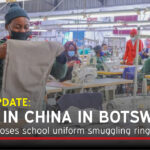Botswana Unified Revenue Services (BURS) is targeting a bumper P60.4 billion collection for the current financial year in revenue generated from income tax, Value Added Tax (VAT) and customs and excise duties.
To help achieve this figure, which is P10 billion more than the tax dog raked in last year, BURS will stamp down on individuals and businesses with outstanding arrears.
Further, those who are not tax compliant will be hunted and made to register and file returns as per the procedure.
According to the available projections, income tax is set to generate P22.2 billion, VAT likely to produce P13.3 billion while customs and excise duties from the Southern African Customs Union (SACU) region poised to bring in P24.9 billion.
Back in February, when delivering the Budget Speech, Minister of Finance, Peggy Serame indicted customs union revenues are estimated to hit P25 billion as a result of a boom in SACU revenues.
This is based on expectations of the fact that post lockdowns, the regional economy has been recovering, leading to more inter-SACU trade, hence more funds.
Speaking at a press briefing to mark the beginning of the individual tax filing season this week, BURS Acting Commissioner-Operations, Zibanani Mokgethi revealed that in order to achieve the set target, they have come with certain initiatives to maximize collection of tax.
“The revenue services developed what is called mobilisation strategy. From domestic tax side our focus is going to be around collection of outstanding returns. We know very well that taxpayers are supposed to file their returns at a particular point in time, so our focus is to go into our systems follow up those who are left behind. We also have those who have tax arrears, we are going after them and we will remind them of their debts and send demand letters. In the event they don’t pay their debts it will allow us to take necessary measures. Our multi disciplinary team will travel the whole country to check if people have registered to pay tax and if they are filing returns,” warned Mokgethi.
Turning his attention to customs and excise duty collection, Mokgethi continued, “From customs side, we are an import based economy, therefore most raw materials used for production are from outside the country. So our focus will be consignment of high risk and high value. Also we know there are bonded warehouses which are not compliant so we should be following such to ensure they comply.”
Despite, the 2022/23 financial year being dominated by temporary measures to alleviate inflation, measures which included a reduction in VAT from 14 percent to 12 percent and zero-rating of cooking oil and Liquefied Petroleum Gas (LPG) for a period of six months, BURS still managed to exceed its target.
While an extension on the decrease in the VAT rate was made, there was no similar extension advanced for cooking oil or LPG.
Even though those measures would have had some impact on BURS collection, the taxman managed to rake in P49.7 billion against a target of P47.5 billion.
“This is mainly based on the projections of macro fiscal tools which projects how our economy is going to look like for the year and be able to determine how much we will get on average from trading. Further, we don’t want to police Batswana to pay tax, there should be voluntary compliance since at the end of the day these funds go for development,” noted BURS Commissioner, General Jeanette Makgolo.
















